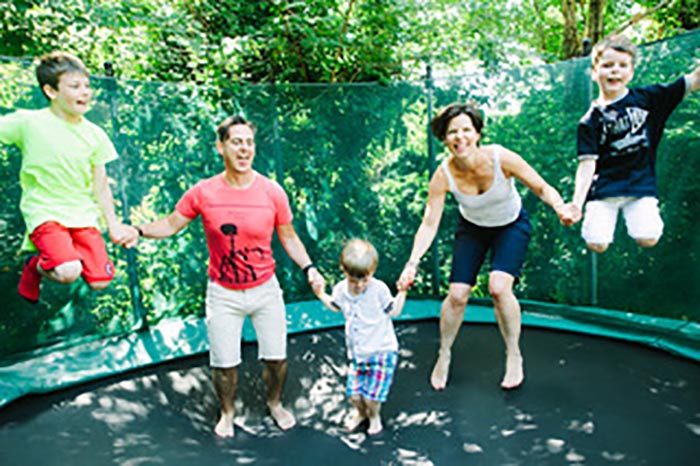Early motherhood. It was the best of times, it was the worst of times.
When I first became a mother, I was living in Ireland. I had taken maternity leave from my job as an account director in an advertising agency. I had been good at my job and had received good feedback—something that I thrived on. As long as my boss and customers were happy, I was happy.
I’d approach my personal development plans with relish. What could I improve on? Where were the learning gaps? What did I need to do to get more responsibility, accolades, recognition?
It was an exhausting merry-go-round fueled by nuggets of approval.
Then I had my baby.
My baby didn’t care about my schedules, my accomplishments, my needs. He didn’t express his approval, only his disapproval. He didn’t care about sleeping at night, or that my boobs were too sore for another feed. So I did what I knew best: I reapplied my efforts.
I drew up spreadsheets of sleep logs (seriously!), I attended breast feeding clinics and bit my lips through the pain of my baby biting my nips. I read Gina Ford and Tracy Hogg and thumbed down page after page. Just like Tracy recommended, I picked up, put down, picked up, put down to try and control my baby’s sleeping, cursing the ache between my shoulder blades. I would go for a daily walk around the neighbourhood with a fully packed baby bag with three nappies, two babygros, and wipes. Just in case.
Where was my feedback?
How the hell did I know whether I was doing a good job or not? Why was the baby crying? Why was he smiling? Why was he pooing so much? Why was he not pooing so much? Why was my husband holding him that way? Why does everyone else’s baby seem to be sleeping through the night whilst I’m up at (let me check my sleep log) 2:47 a.m. to 4:52 a.m., breaking my back picking up and putting down my crying child?
During this time I wrote this:
“The misery catches in my throat. The incessant loneliness, the monotonous labouring toward an unknown goal.
Yet I want for nothing, love, health, children, wealth.
How can this be?”
I was so confused. This was meant to be the happiest time of my life, and yet it was the worst of times.
Some people may have diagnosed this as post-natal depression, but I think it was symptomatic of something else.
Soon, my six months was up, and it was time to return to work. I remember saying to the creative director, “I’m just struggling, you know? What if I can’t do my job to the best of my ability and can’t be a mum to the best of my ability?” He, a seasoned dad, chuckled and said, “Jacky, most of the time you won’t be able to do either to the best of your ability.”
That was too much for me. What? Not be the perfect mother, or the perfect employee? I packed up my career and decided to focus on motherhood. I wanted my child to have the best start in life, and I believed that meant that I had to be with him 24/7.
This was not a magnanimous move. Instead of seeking my worth through my work, I sought my worth through my mothering.
D.W. Winnicott, a paediatrician and psychoanalyst, coined the term the “good enough” mother in his book, Playing and Reality. The basic concept is that the “good enough” mother starts off by being totally attuned to her infant’s needs. She sacrifices her own needs and sleep for those of the baby. As the baby’s cognitive function develops and it begins to develop a sense of external reality (that its mother is not an extension of itself and vice versa), then it has some resilience to experience that the world is not there to solely service its needs. These small ruptures are necessary for a child to learn that he can handle things in life.
A “good enough” mother has a sense of self separate to her child. She is attuned to her own needs as well as those of her child so that she retains balance and energy.
I wasn’t attuned to my needs. I wasn’t attuned to my baby’s needs. I was attuned to an ever-increasing list of milestones and checklists that would prove that my child and I were okay. If the world thought that we were okay, then I would feel okay. Except I didn’t.
A few years into this painful situation, I started learning about codependency—a condition by which, for a plethora of reasons, a person loses their sense of self and tries to fix their feelings through fixing others.
Codependents are so bothered about how others are doing that we neglect our own needs. This is not pretty. We do this through trying to control others, masking our own pain in various ways, denying how we feel, compromising our own values. It’s a sh*t show.
I decided to change my worst of times to the best of times.
>> I sought help from a therapist for my codependency.
>> I learnt about its origins and how, although it was not my fault, it was my responsibility to change if I wanted to have healthy intimate relationships with those I loved.
>> I joined a support group which helped me gain identification and know that I was not alone.
This took time and effort, because that is the truth about change. It takes commitment, tenacity, and willingness.
Seven years later, I’d had my third child.
By that time this is what I had learnt:
I asked for help.
Asking for help is necessary. It takes a village to raise a child. But to ask for help, we first need to learn what that means.
Asking for help is not:
>> Trying to get someone else to read you mind: It’s not making a pained face when you do something for the umpteenth time.
>> Complaining: It’s not merely saying, “I’m so tired.”
>> Triangulating: It’s not talking about someone behind their back hoping that the listener will relay the message so that you get what you want without asking for it.
>> Manipulating: It’s not saying something is “fine” through gritted teeth.
>> Controlling: It’s not asking someone to help and then giving them 101 instructions on exactly how to do it.
Asking for help is:
>> Clearly communicated: It’s saying, “I need you to…”
>> Honest: It’s admitting, “I don’t know how to do this.”
>> Boundaries: It’s being specific about the help you need.
>> Reiterative: It’s expressing what doesn’t work, and asking for what will: “That doesn’t work for me, what I need is…”
>> Humble: It’s saying thank you for the help that you deserve because you are a fellow human being who cannot do it all alone (just like everyone else).
I moved from resistance to acceptance.
I could not change that my newborn would disrupt the house, waking when he wanted, feeding when he needed. So, I moved from focusing on trying to get the feeding and sleeping on schedule.
Yep. I ditched the charts. In fact, I ditched the idea of any control, and each time my baby woke in the middle of the night, I practised gratitude that I had another opportunity to spend time with him. He settled quickly, and I still remember those lovely moments.
I gave up martyrdom.
Sacrificing myself for the sake of my baby does neither of us any good. Rather than spending all of my time with my child, I had to work out a balance that worked for me.
A baby will thrive only to the extent that the mother is thriving. Therefore, my emotional, physical, mental, and intellectual well-being became a priority.
I got the help we could afford (this meant that for a while we had a night nurse, and later a nanny two days a week), and I pursued my dreams, continuing to study for a new career in addiction psychology.
I paid attention to the four S’s.
Daniel Siegel is a renowned neuropsychiatrist. He is a world expert on how human relationships wire our brain, and how our brain is wired for human relationships. Following his extensive research and knowledge, he has a simple principle toward parenting which he calls the Four S’s.
In order for a child to feel secure, the child needs to feel safe, seen, and soothed. What I like about this principle is that it is true whether the child is four months, 14 years, or 40.
Seen
The baby or child not only feels literally seen, but empathically seen. As a parent, this means checking out how they are feeling, refraining from comments to their concerns with, “that’s silly,” or, “no, you’re not,” for example.
Safe
We avoid actions, situations, and speech that could frighten, hurt, or confuse them.
Soothed
We help our child work out how to handle themselves and their lives through caring and taking their concerns seriously.
Then the child can feel secure. When a child feels secure they have internalised two core beliefs: that they are worthy of love, help, and nurturance, and that the world is a safe place for them to be able to reach out and ask for that love, help, and nurturance.
When clients come to see me, I’ll often talk about the four S’s, whether they are parents or not, because they don’t just apply to our children. If, for whatever reason, we did not feel safe, seen, or soothed as children, it will have had an effect on us.
This happens in every family, of course, but the “good enough” parent is attuned to when they have missed a step, and they circle back to repair the rupture that has happened in the relationship between them and their child. Much of the work that I do with clients is about re-parenting the wounded parts of my clients that did not get the appropriate nurturance that they needed as children.
~
Yes, the change from the worst of times to the best of times is an inside job, and it’s not a job we can do alone.
But it’s never too late to make up for things. It is never too late to make up for what we didn’t get or what we haven’t given.
The journey to the best of times starts here with self-healing and, perhaps, being a “good enough” parent to ourselves as well as our children.


 Share on bsky
Share on bsky





Read 0 comments and reply